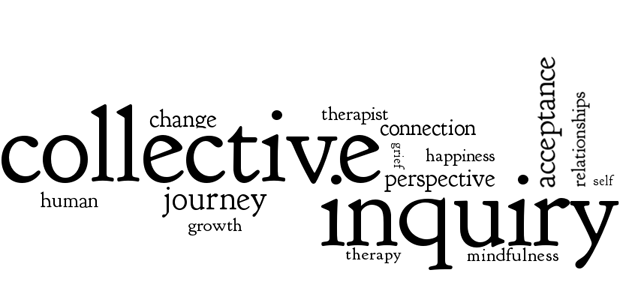

Two years ago, I was attending a workshop for play therapy when a profound statement reached my ears: “What you give as a therapist is what you always needed.” It struck me on different levels and in all of my different roles- therapist, sibling, daughter, friend, and human.
I thought about my “style” or “theory” of therapy. Nearing the end of two years of clinical practices and studies, I still couldn’t pinpoint just one theory that I was drawn to. While I believe that you cannot be a purist in one style (e.g. solely be solution-focused), I had trouble naming my own eclectic theory. Having worked with me closely, my professor spared me the guessing game and categorized it as “Feminist Family Therapy.” As it was the first time I’ve heard of it, I eagerly looked it up.
The principals and philosophy of Feminist Family Therapy:
In my first post for Collective Inquiry, I spoke of courage of those who attend therapy and how I hoped to use this blog to reveal more about how empowerment and self-inquiry has shaped and given meaning to my life.
For that reason, I want to share with you that several principals and themes of Feminist Family Therapy are precisely the defining aspects of what was missing in my life, or was currently being transformed into becoming a strong presence in my values.
The absence I was never able to name before was where empowerment was supposed to be. It was the place where I could be the one driving and arriving at my own decision making. It was the place of making my choices for my sake and no others, and where I alone reaped the rewards or consequences.
For years, that voice was quiet, if not muted.
As a woman, as an Arab woman, and as a Muslim woman, I faced and continue to face internal and external barriers. With each disempowering thought, action, or statement (whether by myself or others), another nail is hammered into that barrier, giving it strength and height to box me in my own, very small world.
What does that look like? It looks like not speaking up when I felt like I had something to say of value. It was my silence giving others more power. It was intimidation of men in my life who were prominent decision-makers. It was shame for standing out amongst the crowd. It was not having enough “strong” women to look up to. It was being told that my emotions made me too sensitive. It was guilt driving my decisions, instead of my gut. It was the media telling me to be someone else. It was never fitting in. It was others who thought they were the experts on my life.
It was not loving myself as much as I loved others.
I gave easily and naturally, not expecting much in return. I hated to see people hurting, uncomfortable, or unhappy. I was always ready to supply validation and acceptance of others, regardless of what they’ve said or done. In a close and large family like mine, that was a lot of people that I wanted to take care of. The problem was that I didn’t turn that care back on myself. Truthfully, not expecting anything in return endangered me into becoming a martyr- the very last thing I wanted to become.
It took several years and a lot of people in my life (including myself) to wake up. To reach out and not wait for anyone to give me power, but to find it within myself. To realize that loving myself only allowed me to give to others in a healthier way.
Now, I see that those VERY things that disempowered me are what moved me to have a deeper empathy for others, a mission to see and hear others only as equals, and ultimately to my helping profession where I believe that teenagers especially long to be accepted in a painful and exciting time of growth.
So the speaker at the workshop was right: What came to me naturally was wanting for others what I had always needed.
Share your thoughts
No Thoughts About what you give is also what you need.